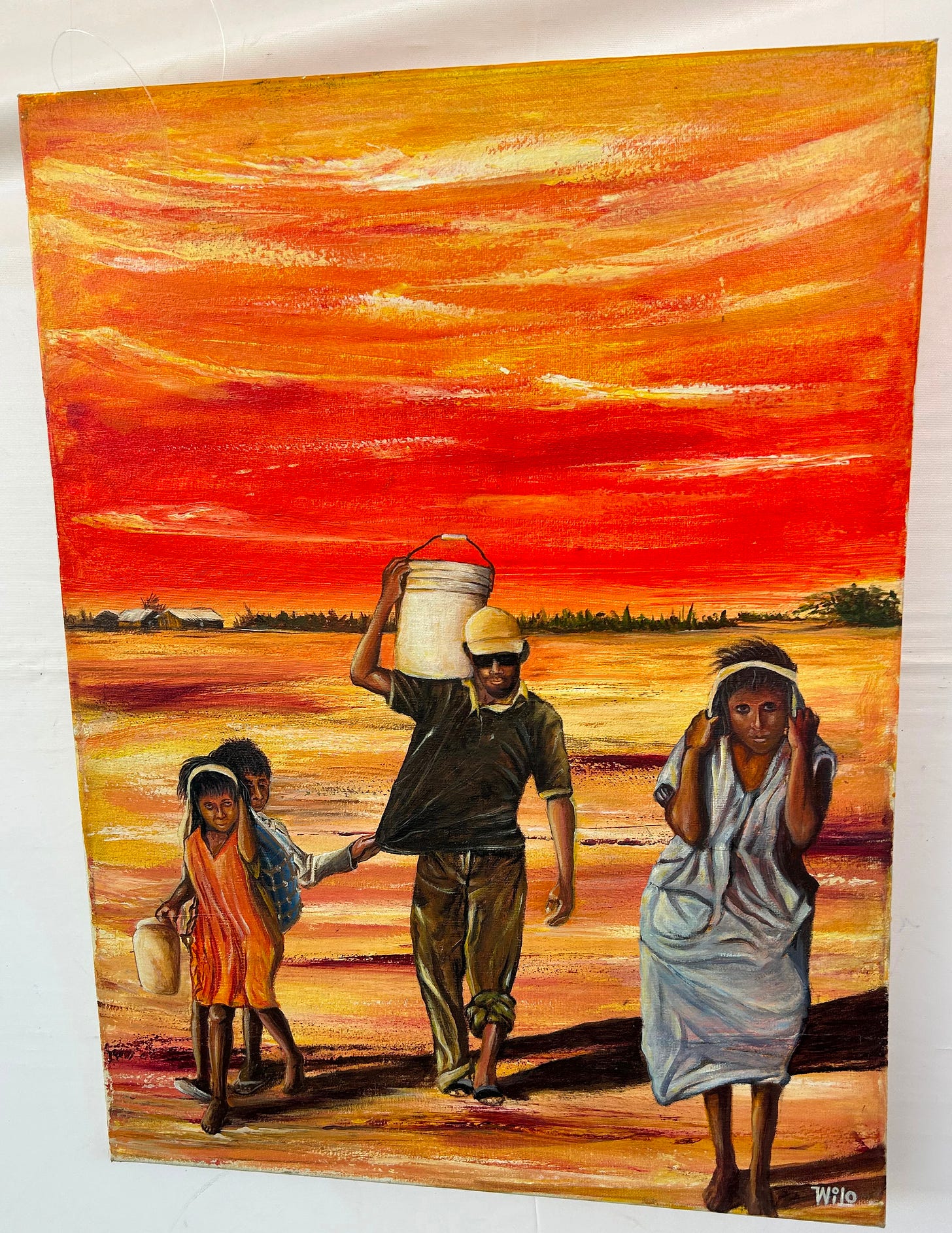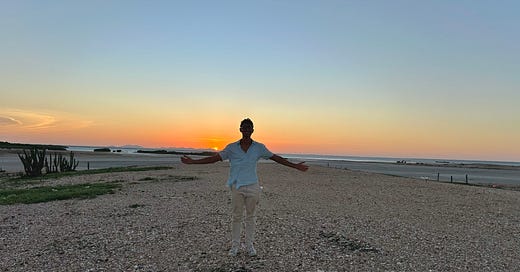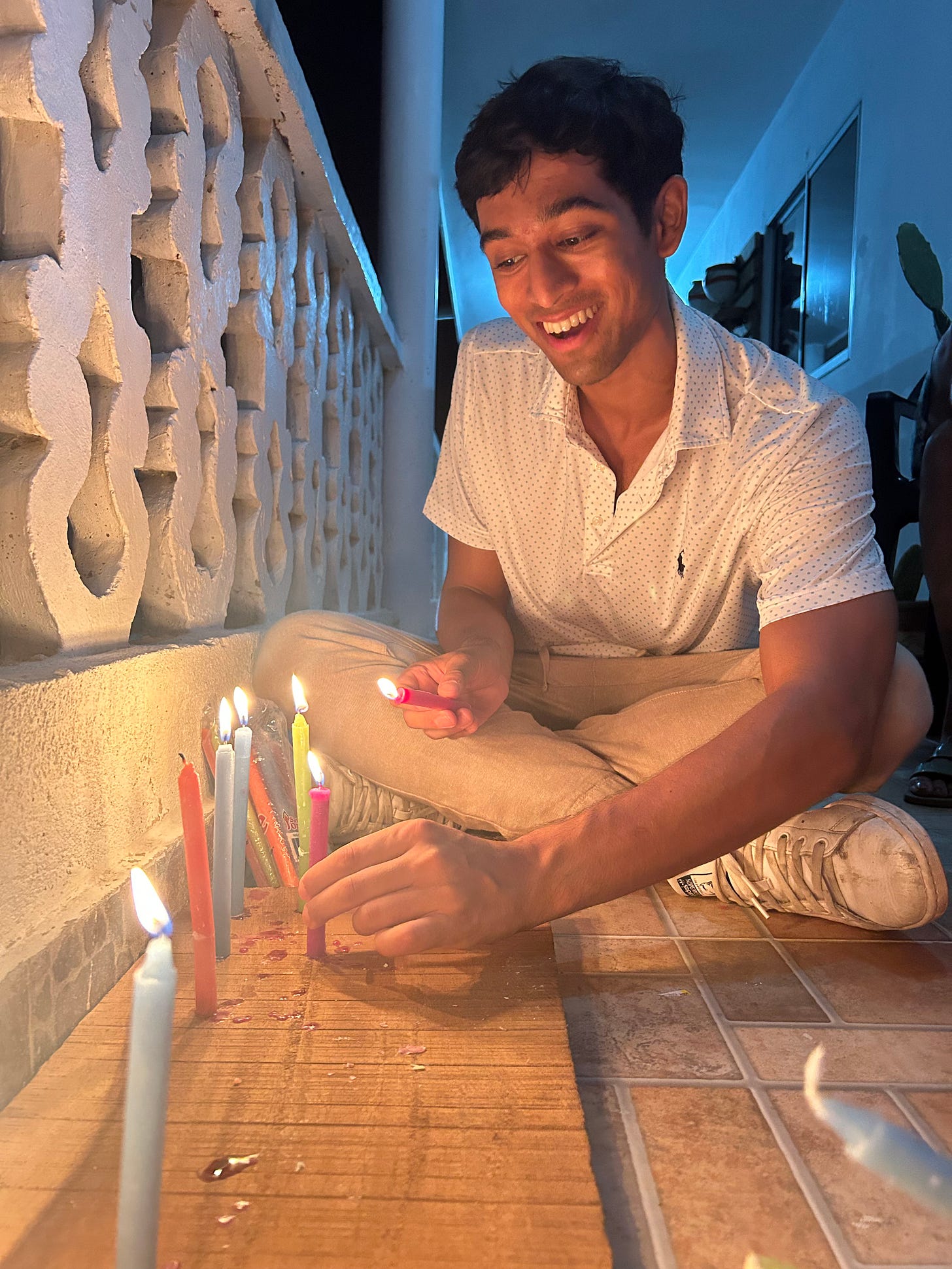Hello everyone! I’ve kinda fallen off the Substack writing trail for a little bit, but now I’m trying to get back into it as the year wraps up. Hope you enjoy these snippets from my homework assignment for Hart!
There's Christmas joy in the suffocatingly hot, slightly breezy air. I’ve bitten the bullet and have accustomed myself to wearing long pants and shedding my Chacos, though adopting this cultural norm has not prevented me from sweating everywhere I go. Still, as work comes to a halting stop and vallenato and aguardiente start to fill the late night streets, I feel a comfort here that I couldn’t have anticipated before.
The other night, my Peace Corps friend and I tracked down a taxi leaving the university after a holiday goodbye event with our Colombian student peers. The sun already set, the buses out of service, and no phone signal, it felt like an apt comedy to have two gringos desperately trying to wave down a colectivo (any broken-down sedan that acts as city taxis) to take them back to the city. The highway is known for robberies, for shootings, for not being the place that you want to be a foreigner in. Yet we had no choice. And, after 5 minutes of desperately waving at any moving car, one finally stopped for us. I turned to my friend and said, “Any chance you would have felt comfortable doing this when you first got here?” His response: “No shot.”.
I came home, 20 minutes late for an online meeting with a potential project partner only to find out that they were 30 minutes late. Still, for a stranger only introduced to me from a friend, I was surprised to find such warmth, understanding, encouragement, and advice for my proposal. I closed my laptop, exhausted, but galvanized for the first time in a while. Will this be the time where a project finally comes through? Then again, it’s Christmas time, aka no work time. But maybe, just maybe, this can be great.
In some sense, this two hour fragment encapsulates my experience so far. Riohacha and La Guajira is an unforgiving backdrop with very forgiving people. The desert sand and high winds of the Alta Guajira, the torrential floods turning streets to rivers and houses to sinking ships, and the unavoidable background noise of late night gunshots, narcotrafficking and paramilitary movement, and eternal poverty never leave my mind. But people dream anyways. They dance cumbia and love karaoke, treat you with their full attention without being transactional or rushed, and they continue making a living, paying the bills, supporting one another, and…listening to vallenato.
I’ve faced multiple challenges from arriving, whether it be related to my personal safety and well-being or the difficulties of my research and work. I’ve met difficult (and busy) people that have given me hope to collaborate and then have disappeared into ghosting me on WhatsApp. But I’ve also met bilingual people who taught themselves English on Youtube, elder indigenous leaders holding the knowledge of the territory in their wrinkled hands, incredibly impressive leaders of grassroots NGOs, and neighbors and university members that opened their doors for me to feel welcome and less alone.
A note on the research:
The research work has been difficult, to say the least. As my bright-eyed self left the Hart Fellowship orientation meeting, I imagined myself building trust with multiple communities and proficiently conversing in Wayuunaiki (ok well maybe that’s a stretch) as I served as the bridge for communication between multinational companies, the government, and Wayuu leaders. Or spending my time collecting data on the implementation of negotiations in order to build a digital dashboard of information for community leaders to use and connect with another. Or being the missing piece to help communities advocate to the government on what specific policies would address their energy and water needs. In all cases, I assumed some sort of personal evolution, in which I would start as a pupil and student before spreading my wings to become an interlocutor and dialoguer between different ontologies of indigenous sovereignty, government efficiency, and company capital.
Needless to say, my early ambition, innocence, and potential arrogance was very quickly extinguished. I pivoted early on to search for students, professors, government employees, and community leaders that had similar interests of improving prior consultation processes and the implementation of renewable energy implementation. I found many people that wanted assistance with their efforts.
ME: “Even better! I get to contribute to sustainable, enduring projects by using my resources and capacity to help others lead community projects!”.
While this was certainly a better approach than my previous one, I ran into new problems. Conversations about collaborations over coffee that I found inspiring and electric turned into WhatsApp conversations trailing off or with my response of “Let me know! I’m around whenever you want to talk about making this happen” remaining unanswered. The support from my mentor has not been what I had anticipated.
However, this does not take away from the fact that I have learned so much from chatting with people and visiting sites with trusted friends and professors. My earlier thesis research on the fallacies of a just transition through prior consultation has been affirmed by many people I’ve met and the corruption and government abandonment I’ve seen. Wayúu indigenous communities are complex, evolving institutions where globalization, internet culture and traditional ancestral knowledge are constantly clashing with each other and tearing apart the social fabric of many families. The large-scale profit-maximization business model of energy companies carries unexpected and extremely damaging consequences for indigenous cultures historically reliant on community solidarity and trust. In other words, a 200 meter wind turbine may be crucial for city residents to access electricity and use household appliances like a refrigerator and washing machine, and for the country to reach its climate goals, but the negative impacts, whether spiritual (communication with ancestors through dreams is disrupted by wind turbine noise), economic (energy infrastructure may negatively impact local livestock grazing), social (communities often enter into conflict over territorial disputes where the project takes place), or cultural (what does the entrance of multinational companies do to our cultural norms and practices), disproportionately put most at risk at losing what it is to be Wayúu.
My on-the-ground observations have been supplemented by the theories and history about economic exploitation and the Global South. I’ve seen that La Guajira has always been an exploited territory for its natural resource abundance, from the arrival of the Spanish 500 years ago to the renewable energy companies usurping land today. But it, along with the Wayúu people, have remained resistant and resilient, by asserting territorial rights and protecting a culture distinct from the rest of Colombia. As my professor said (in paraphrased form), “Look around you. Time moves slower. People aren’t so stressed, worried about deadlines or earning so much money. We are still free. For better or for worse.”
A progressive legal framework, such as Colombia’s Constitution, is a step in the right direction towards protecting the rights of minority ethnic groups, but its implementation is uneven, and its ideas of pluralism–that different cultural value systems can be analyzed side by side in legal rulings–rarely translate into weighing community values with the same importance as company cost/benefit analyses.
What is my role?
One of the main questions I have asked myself throughout this fellowship has been, “What should I as a foreigner really be doing here?”. After all, I did not accept a wealthy family’s generous funding to travel to a “remote place” and “learn a lot of cool stuff”. I accepted it to do something meaningful and to use work to benefit humanity, however minutely. I have the unique privilege and positionality of being free to meet many people, dedicate vast amounts of time to passion projects, access the resources and expertise of my university, and theoretical knowledge about my topic at hand. That should be enough to do something amazing, right?
Yet, I have seen my role with time becoming that of an observer rather than an actor. That is, I empathize with the situation that Wayúu people face, but I still struggle to see what “I can do” to contribute to their fight for sovereignty. Some of it comes from my unique geographical placement. While much of the conflict takes place in rural, isolated areas, I live in the capital. While there are many university professors that have personal ties to these causes, their ties are incredibly personal, dispersed, and contextually unique to one another that make it hard to get involved.
In other words, there is no unified “team-wide” effort in my institution to understand my topic. And, it is incredibly difficult to access the areas that I wish to explore. In response, I have started to look inward to my host location of Riohacha, with the hope of asset and power mapping the city to find points of leverage that could advance environmental justice (ex. Clean up the polluted rivers, protect land rights of indigenous peoples on the outskirts of the city, etc.). But in a culture of economic survival, urban sprawl, and lack of environmental consciousness, it has been difficult to find such assets.
I sometimes wish I could live in a ranchería (community village) for 10 months and intricately understand the conditions facing the 50-100 people surrounding me on a daily basis. I have this dream of attending community meetings under the shade of their cactus sheds, or enramadas, hearing about how they make decisions and trying to funnel resources to construct community solutions such as solar panels and regenerative farming. But I’m not there. I’m meeting many of the leaders who live that life on the weekends and seek education and work in the city during the week. That has allowed me to hear many perspectives. But it also blinds me in complexity.
One such experience has become commonplace with my Wayúu friends and colleagues. When expressing my desire to maximize their voices and opinions within a collaborative project, the conversation usually takes some form resembling this.
ME- What are the community’s strengths?“What do you think it could benefit from?”
FRIEND- “What do you think? It’s pretty complicated, and within our communities we have disagreements about what’s right and wrong. We’re as biased as the companies are. You’re the one that has been researching this, tell us what we should do.”
Various times, both in conferences and classrooms, I have been asked to share my opinion. And I do. Sometimes, people listen to me more because I’m a foreigner. Other times, and rightly so, they wave me off due to my accented Spanish and my nationality. I want to speak less. But what if the political, economic, and mediamachine of marginalizing indigenous voices because they do not fit neatly into the superstructures that make our economy run and our phones hum requires that I voice my opinion? And even worse, what if I still do not know what to think? What if my answer changes every time?

Conrete and Intangible Intentions
The Hart Fellowship has been an exercise in non-linearity and accepting failure. It is difficult to accept that I still do not have a clear project idea that I feel confident I can execute in 2025. While I am trying not to base my well-being on productivity, last minute cancellations, being ghosted on text, and seeing ideas fall apart as people go on vacation has been a source of sadness for me. At the same time, I’ve built relationships with various university students and leaders that have given my life meaning here, regardless of the status of my work. It is my goal to continue relying on these relationships, late night dancing salidas, cooking sessions, karaoke rock-outs, and the other small joys of life here.
In tangible terms, I will plan to rely on these relationships for project ideas. For one, one of my close friends is interested in putting together a small team to make a mini-documentary about the energy transition in La Guajira from the perspective of the Wayúu. Or, when other student friends of mine return back from Christmas break, I will continue networking amongst them to create common spaces of shared reflection about prior consultations (perhaps with a big bang of a student forum between Wayúu young leaders towards the end of the Fellowship).
And finally, looking forward to after Hart, I will search for work that is relational and that is connected to well-functioning social ecosystems. I want to be part of vibrant, socially dynamic spaces where there’s always movement, dreaming, and fighting. It looks like I’ll have some job search work to do over the next few months.
On my first day here, a professor I had met once picked me up in his sedan and dropped me off at my hostel. I made the short two minute walk to the beach, forming the initial sweat stains that would remain on my shirts for the time since, for a solitary reflection on the rocks. My first wins were small–talking to one new person a day, going out to a bar, asking a kid to play soccer with me on the beach. And, of course, there were early days where all I wanted to do was curl up and crank the AC unit in my small room and dream out of my loneliness.
Today, I walked 45 minutes home from the gym as the sun set over Riohacha. Last night was a holiday, La Noche de Las Velitas, in which families came together to light candles in honor of the Virgin Mary. And instead of taking the route of staying in my apartment and reading to fill the hours, I went to a close friend’s house. I danced the night away with her six year old niece to everything from Colombian cumbia to Ice, Ice Baby. And I made a wish with my first candle.
I hope it comes true.







despite the set backs and humility, wonderful to read about your continued optimism and gratitude for people met, experiences had and lessons learned!
Feliz dia de las velitas!!